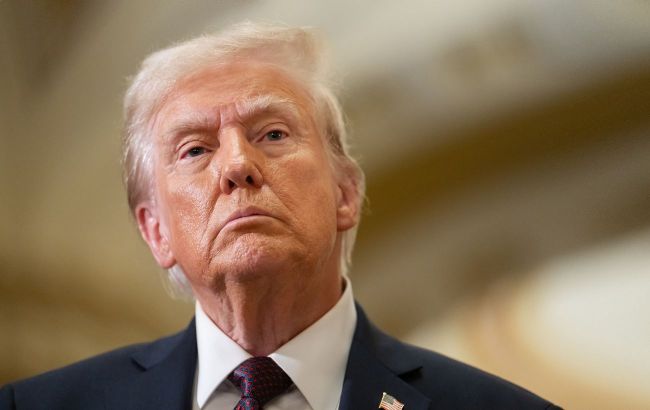End of birthright citizenship in the US? Trump's decision sparks legal challenges
 Photo: US President Donald Trump (Getty Images)
Photo: US President Donald Trump (Getty Images)
US President Donald Trump signed an executive order aimed at abolishing the "right of soil," which automatically grants citizenship to any individual born on US territory.
RBC-Ukraine explains what obstacles Trump might face.
Contents
- Did Trump abolish birthright citizenship?
- What is birthright citizenship in the US?
- Are there court rulings on citizenship for migrants’ children?
- Who cannot become a citizen even if born in the US?
- How many people might be affected?
- Where else is birthright citizenship practiced?
- What could hinder Trump?
Did Trump abolish birthright citizenship?
According to the 14th Amendment to the US Constitution, all persons born or naturalized in the US and subject to its jurisdiction are citizens of the United States and the state in which they reside.
In the executive order, Trump argues that the amendment never extended citizenship to everyone born in the US. It has always excluded those not under US jurisdiction from birthright citizenship.
These categories include those whose:
- mother was unlawfully in the country at the time of birth, and the father was neither a US citizen nor a lawful permanent resident.
- mother was in the country lawfully but temporarily (under visa waiver programs or with tourist, work, or student visas), and the father was neither a US citizen nor a lawful permanent resident.
Trump ordered that applications for citizenship and documents recognizing US citizenship not be processed for the above categories.
An executive order from the president becomes law without Congressional approval. However, the law is not retroactive, meaning it does not apply to those born in the US before the order’s enactment. It also won’t apply to children born within the next 30 days.
Trump has long promised to change US policy on this issue. His order targets denying citizenship to children of migrants who are either in the country illegally or on temporary visas.
Concerns have arisen that, in a country where birthright citizenship is deeply rooted as a value, the president’s attempt to revoke this right for future generations could lead to policies explicitly targeting communities of color, writes The Guardian.
It remains unclear how this mechanism will be implemented. Trump’s initiative has already faced legal challenges, with numerous states suing the federal government.
What is birthright citizenship in the US?
The principle of jus soli (Latin for "right of soil") originates from English law, which centuries ago held that all those born in England were its subjects.
Unrestricted birthright citizenship in the US stems from the American Constitution. Until the latter half of the 19th century, it applied only to white Americans. For example, in 1857, the Supreme Court ruled in Dred Scott v. Sandford that descendants of Black slaves - African Americans - could not be citizens.
This changed after the Civil War. The 13th Amendment abolished slavery in 1865, and three years later, the 14th Amendment enshrined the right to citizenship for former slaves born in America.
The principle that those born or naturalized in the US and under its jurisdiction are citizens, along with a series of related laws, became the foundation of modern birthright citizenship policy.
Hardline supporters argue that this policy is a "major magnet for illegal immigration," encouraging undocumented pregnant women to cross the border. This phenomenon is derisively referred to as "birth tourism" and "anchor baby."
Are there court rulings on citizenship for migrants’ children?
After the ratification of the 14th Amendment, Americans actively opposed migrants, particularly Chinese laborers. Soon, Congress passed a law greatly restricting migration from China and complicating life for those already in the country.
The case of United States v. Wong Kim Ark put an end to this issue. Wong was the child of Chinese migrants but was born on American soil. He traveled to China to visit relatives but was denied reentry to the US on the grounds that he was not an American citizen.
The Supreme Court viewed the situation differently. The justices ruled in Wong’s favor, recognizing him as a US citizen despite his migrant parents’ inability to naturalize.
"This case confirmed that regardless of race or the immigration status of parents, all persons born in the United States are entitled to all the rights granted by citizenship," the BBC quotes Erika Lee, director of the Immigration History Research Center at the University of Minnesota.
Since then, the court has not reviewed the issue. The US operates under common law, so decisions made over 100 years ago can still be referenced today.
Who cannot become a citizen even if born in the US?
Despite the constitutional amendment, there have been and still are exceptions to the principle of jus soli. For example, until the adoption of a specific law in 1924, Native Americans were not recognized as US citizens.
American law distinguishes between nationality and citizenship. Residents of unincorporated territories such as Puerto Rico, Guam, the Northern Mariana Islands, and the US Virgin Islands are nationals and citizens of the United States.
However, residents of American Samoa, according to a 2021 Supreme Court ruling, are nationals but are not automatically guaranteed citizenship by birthright unless Congress enacts a relevant law.
Children of foreign diplomats or, in a stricter scenario, "children of hostile occupiers" cannot claim birthright citizenship.
At the same time, a foreign-born child may acquire US citizenship if at least one of their parents is a US citizen. This rule applies only to one generation.
How many people might be affected?
According to Pew Research, approximately 250,000 children were born to undocumented migrants in the US in 2016. By 2022 (the latest year with available data), this number could have reached 1.2 million children.
Since these children will also have descendants, the cumulative effect of eliminating birthright citizenship could increase the number of undocumented individuals to 4.7 million by 2050, according to the Migration Policy Institute.
In December 2024, Trump stated he did not want to break up families, so children of undocumented migrants born in the US should be deported along with their parents.
Where else is birthright citizenship practiced?
"We must put an end to this. We are the only country where it exists," Trump previously criticized birthright citizenship.
But this is not true. Today, over 30 countries practice unconditional jus soli in most cases. Most of these countries are in the Western Hemisphere, including Canada and Mexico.
In other regions, this right is less common. Australia and the United Kingdom grant automatic citizenship to a child if at least one parent is a citizen or permanent resident.
For example, in Ukraine, citizenship is granted to a child born on its territory if:
- the child does not acquire foreign citizenship through the jus sanguinis principle from their parents;
- the parents have been granted asylum or refugee status;
- the child is stateless (or their citizenship is unknown).
What could hinder Trump?
Most legal experts agree that Donald Trump cannot revoke birthright citizenship for migrants' children through an executive order.
"He does things that upset many people, but ultimately, the courts will decide. This is not something he can determine unilaterally," the BBC quotes constitutional expert and University of Virginia law professor Saikrishna Prakash.
Revoking jus soli would require a constitutional amendment, which necessitates a two-thirds majority in both the House of Representatives and the Senate, as well as the approval of at least three-quarters of the states.
Currently, this is unlikely, as Republicans hold a slim majority in both chambers, and not all of them support a hardline stance against migrants. Moreover, nearly two dozen states have already sued the federal government.
A coalition of 18 states, including New Jersey, New York, and California, has filed a lawsuit in Massachusetts to overturn Trump's executive order. Another group of states - Arizona, Oregon, Illinois, and Washington - has filed a separate lawsuit in Seattle. The hearing is expected tomorrow, January 23.
"The Constitution could not be clearer: the citizenship of children born in the United States does not depend on their parents' citizenship. This principle is fundamental to who we are as a nation and what it means to be American," said New Jersey Governor Phil Murphy, a Democrat.
According to New York Attorney General Letitia James, Trump's actions are "not only unconstitutional but extremely dangerous." Ultimately, the case may reach the Supreme Court, where conservative justices outnumber liberals 6-3.
The day before, in the Oval Office, a reporter asked Trump if the court could declare his executive order unconstitutional. "Maybe. I think we have strong grounds. But you might be right. We'll find out," the US president replied.
Sources: Trump's executive order, BBC, The Guardian, and The Washington Post.

